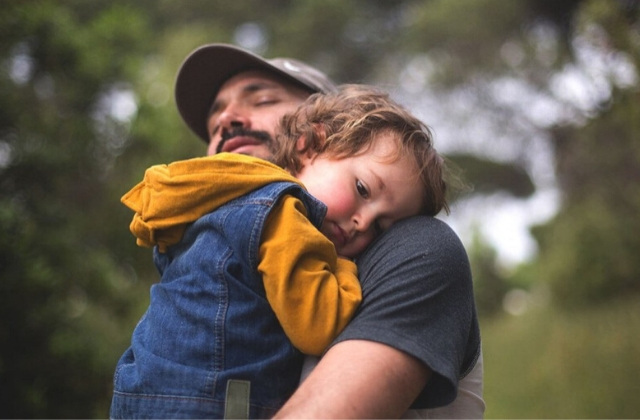It is normal to feel anxious. We all have. Who hasn’t stayed up all night wondering about examination results, or awaiting replies that could impact your future? Wedding planning, the birth of a new child, moving to a new city, most big events in our lives are accompanied by anxiety. However, it should be treated as a common reaction, healthy even, if your child is nervous before performing on stage or visiting the doctor’s clinic. It is all right to be nervous for children, especially because the world functions according to adult systems of economy and social etiquette which the children are still trying to wrap their minds around.
So when do you understand whether your child is being anxious as a part of normal reactions or suffering from an anxiety disorder? You can differentiate between the two by measuring the responses of others to your child. If your child is disproportionately nervous about a certain situation or event, to an extent that is affecting their physical and mental well-being, they might be suffering from an anxiety disorder. These are a few traits you can look out for to understand anxiety in your children.
In this article:
Signs of Anxiety in Children: Every Parent Should Know
What can you do to Help?
7 Signs of Anxiety in Children Every Parent Should Know
Nail Biting, Skin Picking, and Hair-Pulling in Anxiety-Inducing Situations
If your child is biting their nails or picking off their skin in an attempt to deal with their anxiety, this behavior falls under body-focused repetitive disorder or BFRD. This is not limited just to these three actions; it can include scratching your scalp or skin obsessively, without any concern for their comfort. These are clear indications of the fact that their anxiety is just harmless nervousness before something they are afraid of. See if they do it often in most situations of high pressure. Slightly older children may crack their joints or bite their cheek because of anxiety too.
Obsessive Fear of Dirt, need of being things in Order and Obsession Over Lucky/Unlucky Numbers
For children, it can be hard to detect a pattern as most children, by nature of being children, obsess over things until they are bored by them. However, if your child is cripplingly obsessed over any of the following- for example, they may refuse to eat anything because of the fear of being contaminated, or refuse to go to the 13th floor of any building or get on a car with 13 on it- might be suffering from OCD- obsessive-compulsive disorder. It can also manifest itself in other ways in slightly older kids, like being obsessed about grooming, wearing perfectly ironed clothes, shined shoes and ordering the same food.
Difficulty in Breathing and Chest Pains when Anxious
This reaction is definitely not normal and a part of extreme panic disorder. If your child hyperventilates, has troubled breathing without having any illnesses that might cause it and chest pains when faced with a situation that might increase anxiety, it is a sign of your child suffering from anxiety.
Persistent Nightmares Experienced over a Short Span of Time
All children have nightmares. It is not uncommon for them to wake up scared and call onto their parents for assistance. However if these nightmares happen continuously and are always accompanied by panic, fast breathing, and nervous sweating, your child might be suffering from PTSD or Post Traumatic Stress Disorder. Some unfortunate traumatic incidents might have been experienced by your child- perhaps a ghost story, a bloody street fight, a scary movie, which continually causes flashbacks and stress.
Trouble Falling Asleep and Frequent Urination/Bedwetting after the Age of 3
These are signs of Generalized Anxiety Disorder which indicate your child is suffering from an anxiety disorder. It should be kept in mind that guardians need to notice a pattern and not overreact about one-off incidents. If your child has trouble falling asleep over a month, you need to go to a doctor.
Refusing to go to School, Difficulty in Socializing and Turning in Homework
Every child has occasional tantrums about not wanting to go to school. However, if you notice nervous jitters and persistent nervous assertions about not wanting to go to school, your child might have Separation Anxiety Disorder (SAD). Some children are shy by nature whereas others are outspoken. It isn’t right to worry if your child simply has trouble making friends, but if they complain of stomach ache, cry, and throw temper tantrums repeatedly, you might consider medical consultation.
Phobias- Fear of a Specific thing or Situation
We all have phobias, either of cockroaches, the dark, or cramped spaces. However, if your child has phobias which make daily lives inconvenient for them and everyone around them- (like fear of getting into a car, shaking hands, crossing roads) and they aren’t going away after careful persuasion, it might be a manifestation of anxiety disorder.
What can you do to Help?
The first thing would be to go to a mental health professional, undergo the necessary tests and classify their condition and severity. For extreme cases, your child may need medication.
Then, empathize and listen. Understand what is going on in your child’s mind and rationally try to talk to them. Do not yell or be frustrated- remember they already feel vulnerable.
Try to calm your child down. Ask them to list things around them, list colors and smells. Counting from 1 to 100, recounting a happy memory can distract their mind and bring them back to ground reality from panicking.
Consider your parenting style and your behavior when anxious. Try to set the right example for your child. After they are more comfortable, try to confront the trigger of the anxiety head-on. Above all, be patient and supportive. Children with anxiety go on to live lives as happy, functional adults with a proper support system and mental healthcare.
References
https://www.goodhousekeeping.com/life/parenting/a28439532/anxiety-in-kids/
https://www.anxietycanada.com/learn-about-anxiety/anxiety-in-children/
https://adaa.org/living-with-anxiety/children/tips-parents-and-caregivers
https://kidshealth.org/en/parents/anxiety-disorders.html













